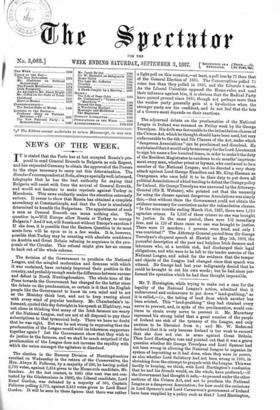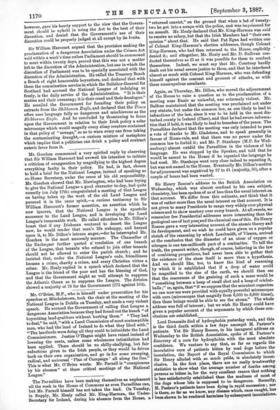Mr. T. Harrington, while trying to make out a case
for the legality of the National League's action, admitted that it endeavoured and endeavours to put down" land.grabbing," as
it is the taking of land from which another has been evicted. This" laud-grabbing" they had strained every nerve to prevent, and, in spite of the proclamation, would con- tinue to strain every nerve to prevent it Mr. Macartney expressed his strong belief that a great number of the people of Ireland are sick of the tyranny of the League, and only anxious to be liberated from it ; and Mr. W. Redmond declared that it is only because Ireland is too weak to succeed that she does not rise in arms against Great Britain. Then Lord Hartington rose and pointed out that it was a grave question whether Sir George Trevelyan and Lord Spencer had not been wrong in allowing the National League to organise its system of boycotting as it had done, when they were in power, as also whether Lord Salisbury had not been wrong in 1885, in shrinking from the attempt to grapple with the League. This was hardly in keeping, we think, with Lord Hartington's confession that he and his friends would, on the whole, have preferred,—if the Government had thought it safe,—to proceed under the other sections of the Crimes Act, and not to proclaim the National League as a dangerous Association; for how could the omissions in Lord Spencer's and Lord Carnarvon's government of Ireland have been supplied by a policy such as that ? Lord Hartington,
however, gave his hearty support to the view that the Govern- ment should be upheld in using the Act to the best of their discretion, and denied that the Government's use of their discretion could be properly judged at all except by its fruit.



































